KnowledgeConf - has it taken off or not?
In April, we held the first professional conference on knowledge management in IT companies. There were a lot of reports with a lot of practical cases for those who “got sick”.
Under the cut, a glance at the event through the eyes of a member of the program committee, the conference speaker and a simple participant: on top presentations, the heavy share of the speaker, and practical tricks that we managed to pull out for ourselves from the event.

')
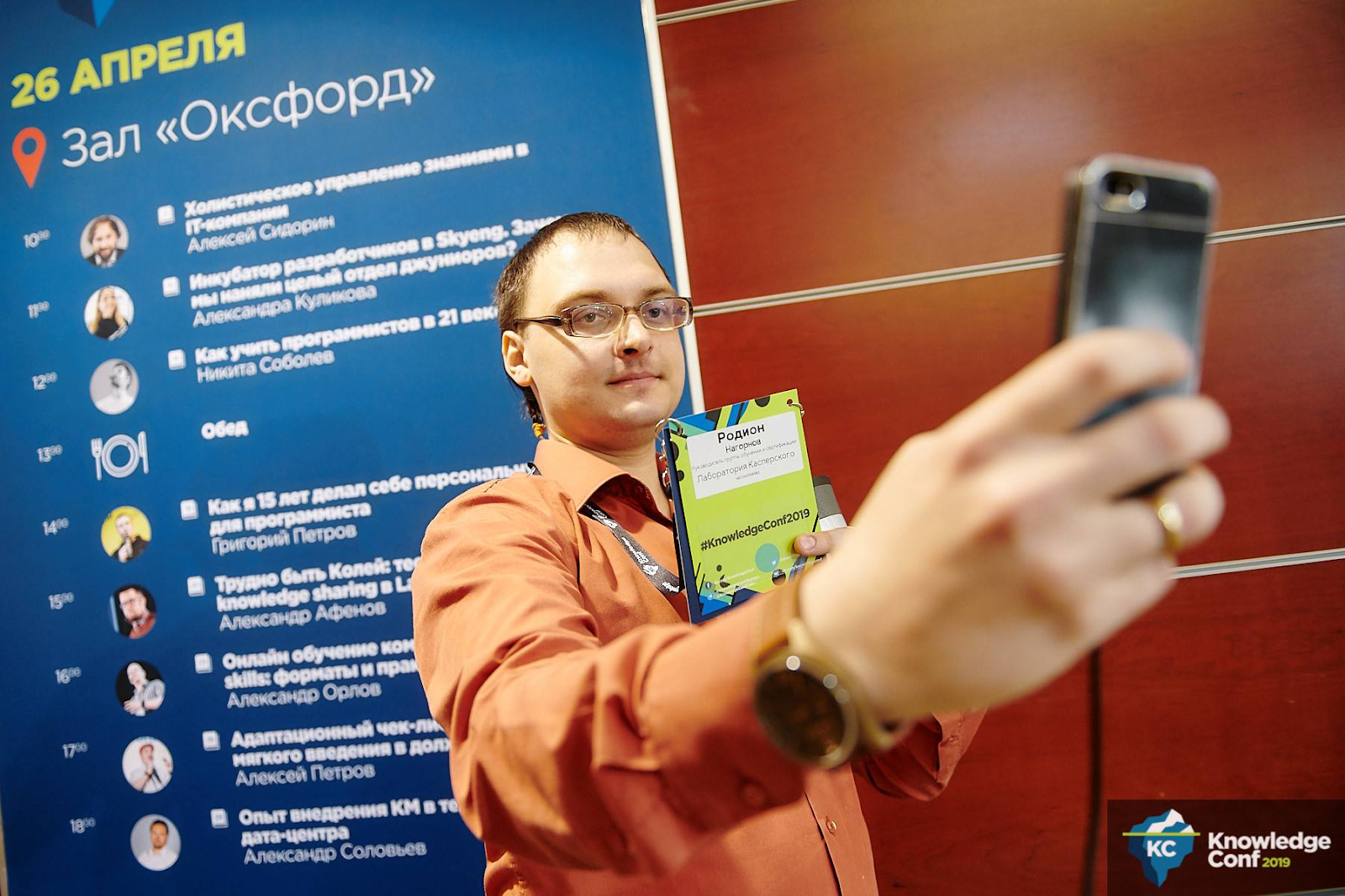
- Did the public interest in the conference meet your expectations?
It so happened that for me it was the third conference about knowledge management in three weeks, so there is something to compare with. I will say this: the interest of the IT audience to this topic exceeded my expectations, because the attendance of Knowledge Conf was much higher than the previous two conferences, which were positioned by their organizers to a wider audience.
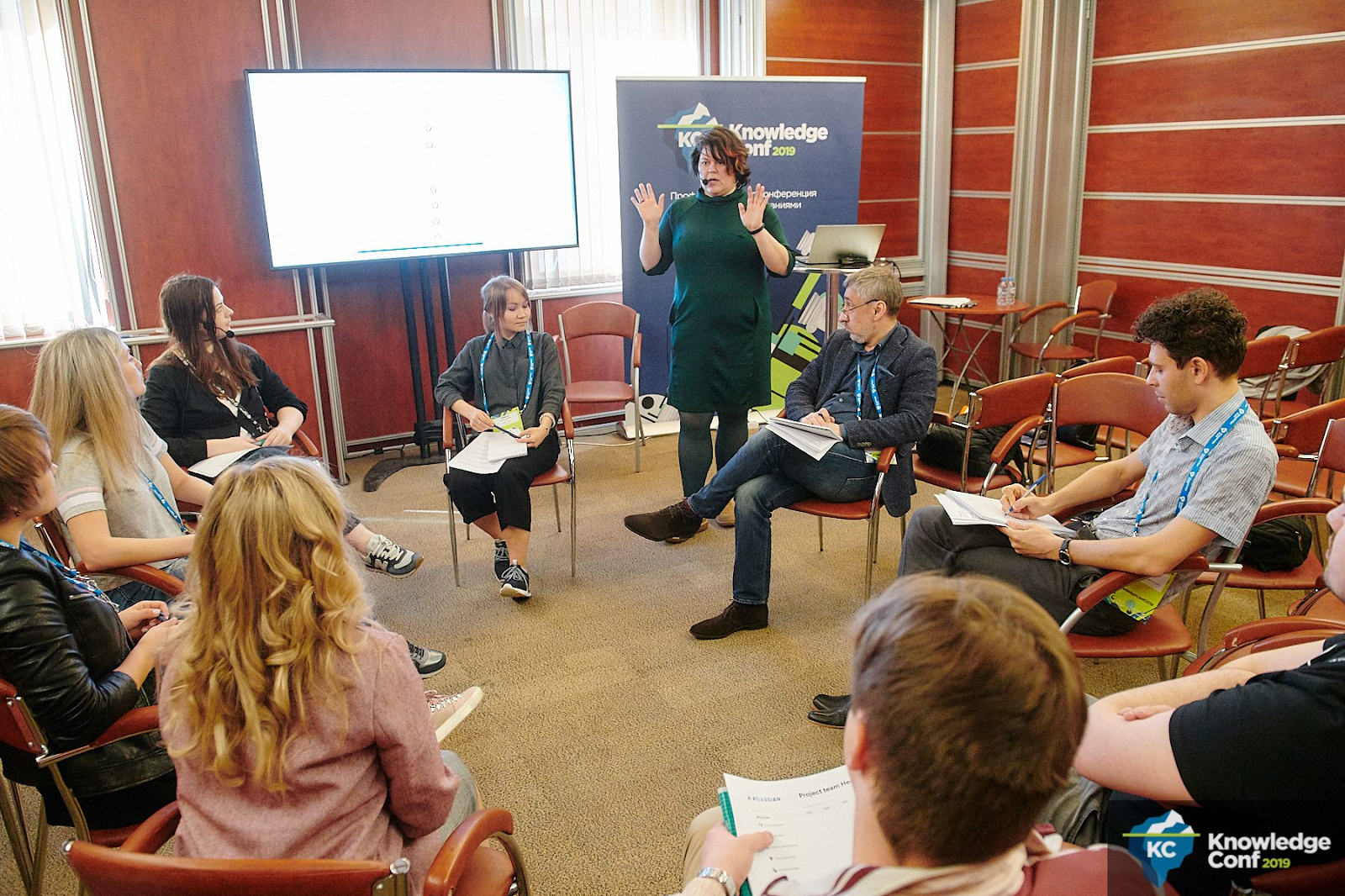
In my personal opinion, knowledge management is a very important process in any company. What can we say about IT, where everything changes with great speed: from programming languages to personnel. And I am very pleased that so many colleagues share this opinion.
- How would you rate the maturity of the entire knowledge management industry in our country?
Large corporations in the public sector, in the oil industry, have a fully mature process of knowledge management, actively cooperate with foreign leaders, learn from experience. They have something to learn. In the commercial segment definitely can not be said. Very heterogeneous. There is a KROK close to the ideal, for example. But it is rather an exception. Most companies are only beginning to realize that knowledge is their key capital, that developing knowledge sharing processes is vital for success in a rapidly changing environment. What is better for the whole company to learn from one mistake than to lose money on the same mistakes of each department.
It seems to me that the emergence of a separate conference on knowledge in IT is a kind of marker that the knowledge management industry is waiting for a leap in development in the near future.
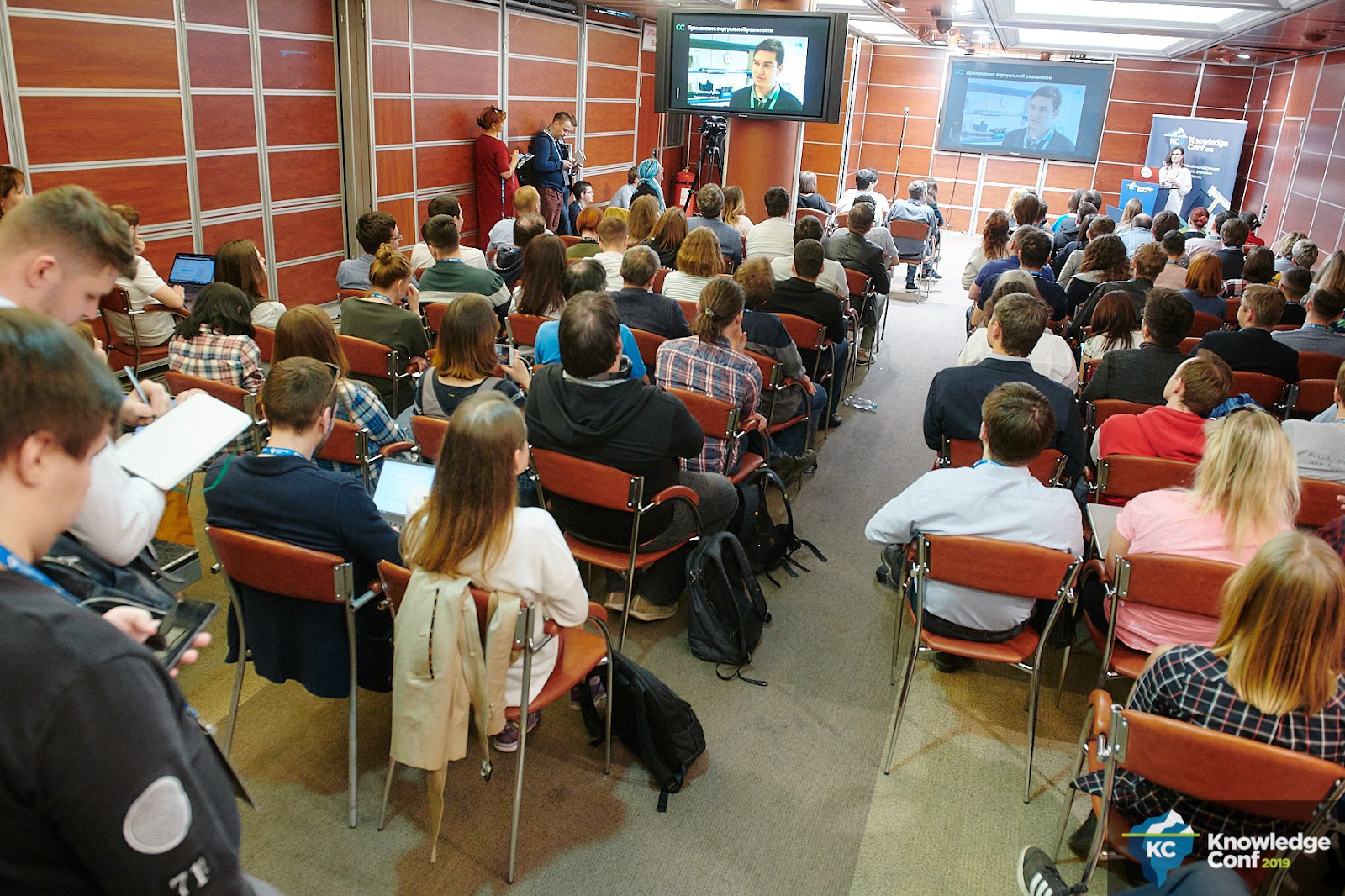
- Did you cover all aspects? What is sure to talk about next time?
Of course, all aspects cannot be covered in one day. The scope is very extensive. For 24 slots of reports, we had 83 applications. You understand how many speakers had to refuse.
Of course, a number of aspects remained behind the scenes. For example, I really didn’t have enough reports from manufacturers of knowledge management software (yes, there are such) about how they reveal what is needed for effective knowledge management, what research is based on, etc.
It is imperative to expand on the subject of evaluating the return of investments from UZ, the evaluation of the effectiveness of UZ and the staff responsible for this. This will help us to understand the importance of UZ, it is easier to promote ideas in our companies and to understand our place in the company's business. At this conference there were a couple of reports on this, but this question was, in principle, very poorly worked out. Therefore, even two reports are very few for some completeness.
- What reports, in your opinion, were the most useful?
My favorite is Alexey Sidorin. His report was filled with a huge amount of practice, approaches, rakes and artifacts. The presentation of this presentation can now be found on the conference website. By the way, the presentations of other speakers, we also posted a long time.
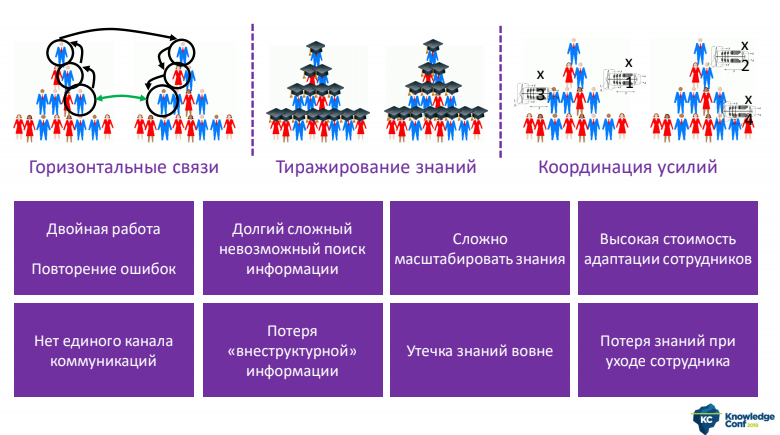
Besides him, the report by Alexander Orlov from Stratoplan and the absolutely wonderful story of Roman Khorin that the tool for the knowledge management system should be chosen based on the real needs of the team, and it is not necessary to buy an expensive solution, went very well.

In general, with such a competition, it would have been physically impossible to physically accommodate even one weak or useless report, so they were all good. I think each of them found his audience and brought someone a favor.
- What topics and reports have gathered the largest audience?
I moderated Oxford Hall, so I can only say for sure about it. These were the reports of Alexey Sidorin , Alexey Petrov , Grigory Petrov . The rest of the reports also had quite a lot of listeners. Judging by the reviews of colleagues from the PC, it was also hot in other halls, and we were surprised at the influx of visitors.
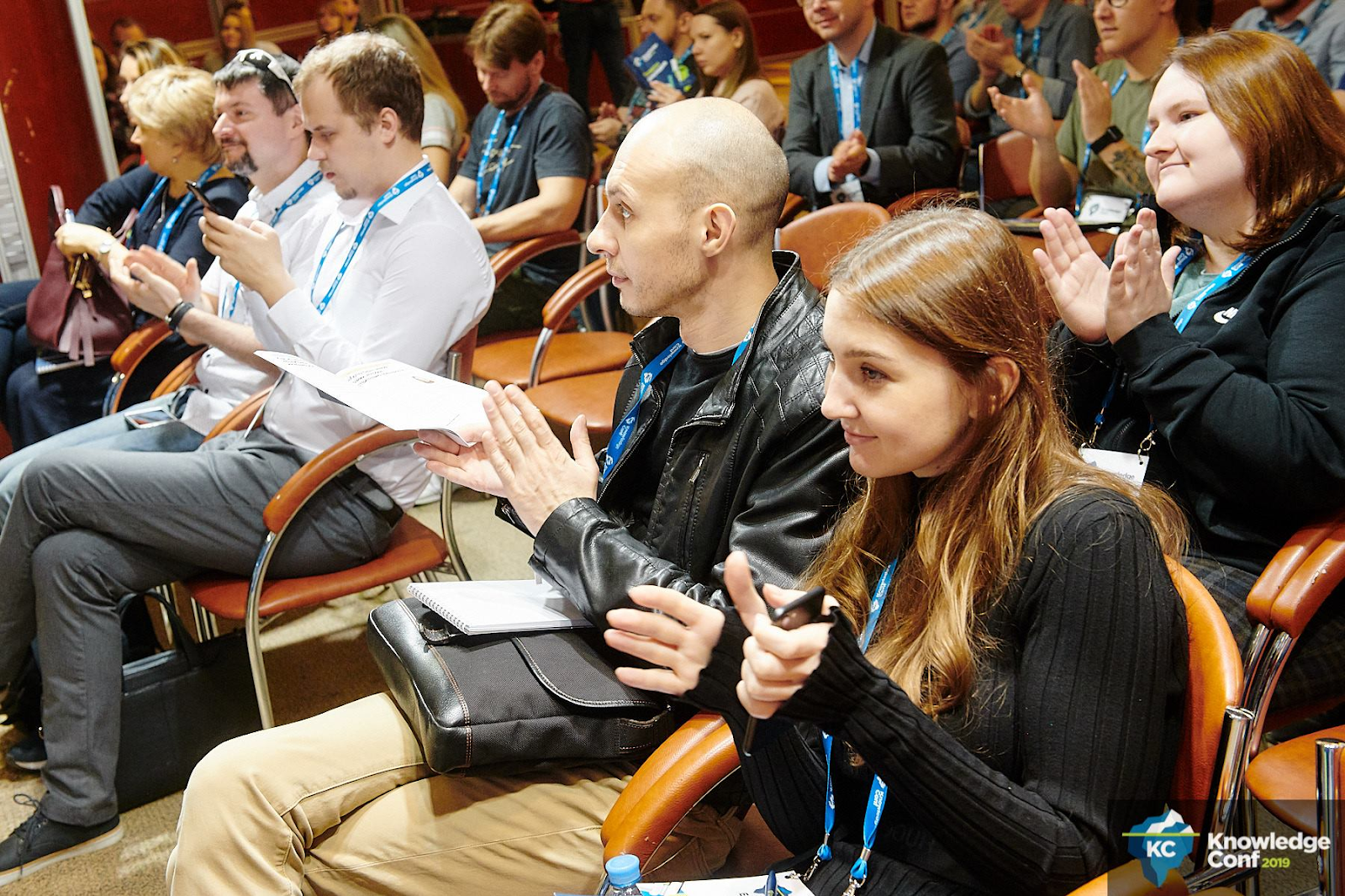
- Were there any interesting examples or thoughts that can be “implemented right here and now”?
We with the PC in general tried to direct all speakers to the side of the practice. So that listeners can really just take and do. The same adaptation checklists for onboarding novice from Alexey Petrov or daily additional training of new technical support changes on cases of previous shifts from Alexander Solovyov.
- What did you personally find most interesting?
Personally, I liked the fact that we brought together people of completely different formations and mentalities on one platform: direct professionals of KM, for whom it is a lifestyle, people from the academic sector, commerce, coaching, enthusiasts, developers, who were engaged in KM, to solve a specific task of their Department ... We collected them and made it possible to share experiences, transfer knowledge, learn to understand each other. From this, in the future, the coolest trade union can turn out, where the different views and competencies of the participants will lead to the most unexpected decisions and discoveries.
I myself am directly involved in knowledge management, and communication on the PC with developers, who for me are usually the target audience, their understanding of knowledge management was a great discovery. Until now, I can not digest it, because I, with my bell tower, represented it all in a completely different way. And the ability to understand your target audience is one of the keys to effective knowledge management.
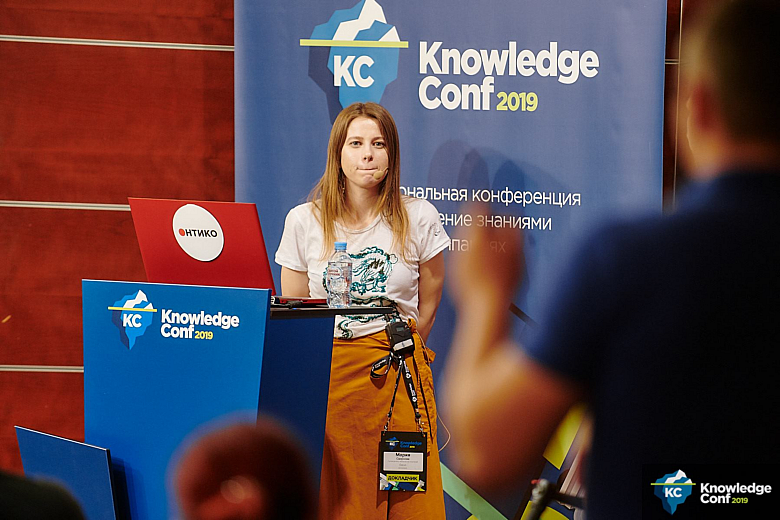
- You presented your report " Knowledge Management with the rapid growth of the company ." Did you like the conference as a speaker?
Yes of course.
- How was the preparation of the report with the program committee? How much has the story conceived by you changed?
We had two test runs with the program committee members, during which the organizers looked to see if my story was suitable for the conference format, whether it was necessary to expand some parts, to add information. Both times I received feedback from them and recommendations for improvement. In addition, they were phoned with a coach who helped add a little bit of substance. Initially it seemed to me that some things should not be told, but he recommended to dwell on them in order to show why such solutions were used.
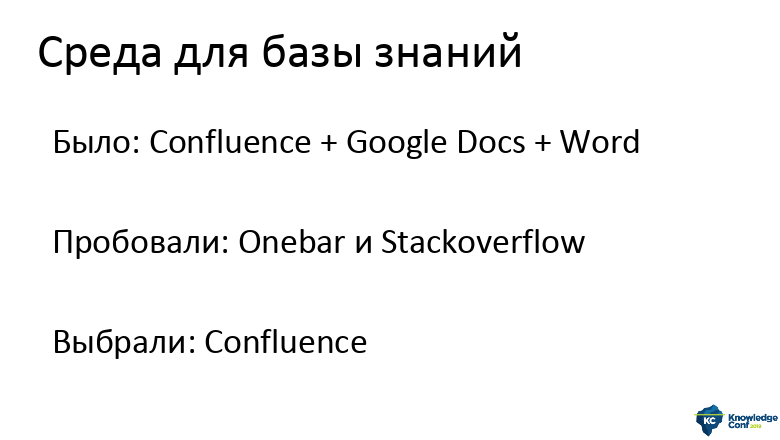
The general line of the story remained unchanged, but in the course of this work almost the whole ending and some details appeared in the report itself.
- And what was the reaction of the audience?
The subject has caused a keen interest. There were so many questions.
In general, the report was about our specific timeline - what exactly we did, how our processes changed and why, what we came to in six months. Therefore, unfortunately, I had no answer to some of the questions from the audience. They dealt with some specific situations to which we have not yet grown. When we start working with a large number of teams, perhaps the questions asked will be relevant for us, and we will find answers to them.
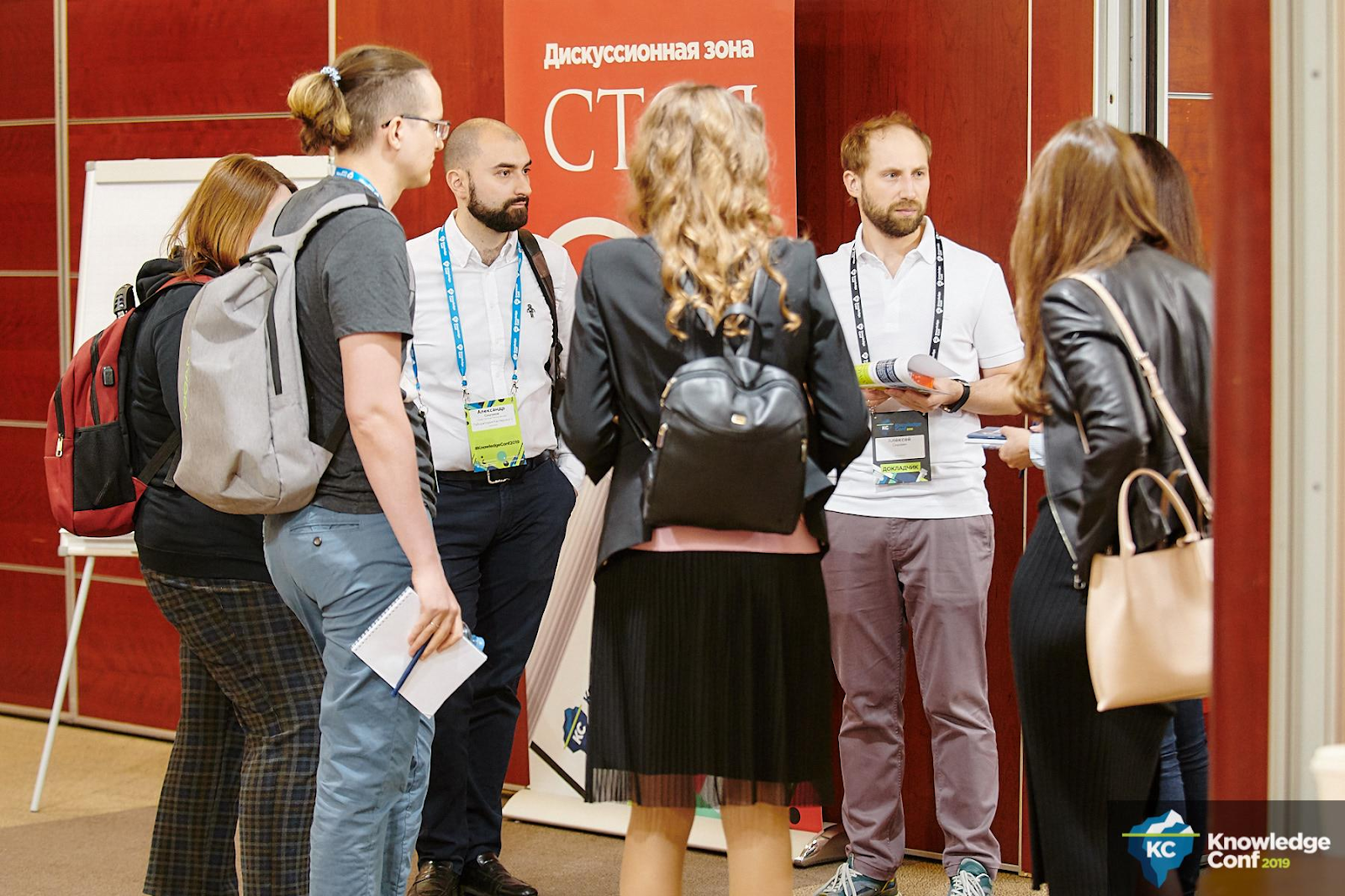
- And as a viewer, what topics were interesting to you at the conference?
I went to the KnowledgeConf to see how other companies evaluate the effectiveness of this process. Traditionally, this topic is least revealed, because people share some specific experience - what and how they did. But they say very little about the assessment.
- What reports do you remember most?
I liked the big and rich report by Alexey Sidorin from Krok company (“Holistic knowledge management in an IT company”). Their entire knowledge management system is very rich. There are various chat bots, and staff, and interactions between HRs, and IT solutions that they have already established.
It was interesting to listen precisely because of the abundance of instruments, because we are just starting. They want to implement their ideas, because they already have experience - how the company did it.
Also, from the BIOCAD report, I got an idea for tagging information and role models of employees. And about the chat bot (in different versions of the bots talked about three of the five reports that I listened to).
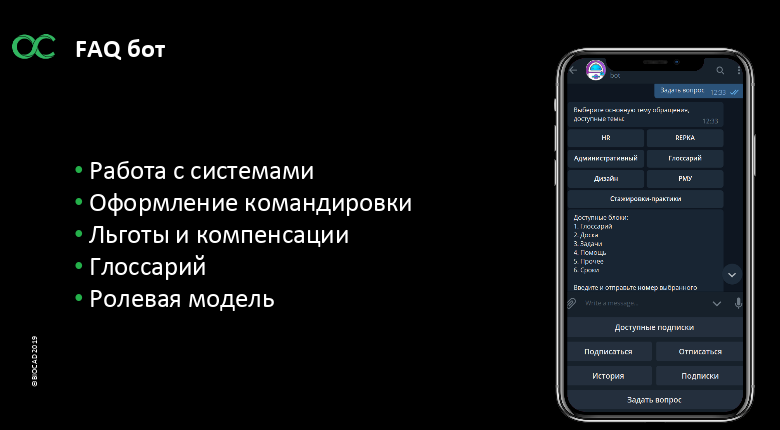
- What impressed you most on KnowledgeConf?
I met a lot of people. Most of all I liked to participate in interactions. At the Igor Zupko mitap, “Technologies of the Future for Knowledge Management: A Session of Collective Dreaming,” we dreamed of cool tools that could solve all our problems related to knowledge collection or onboarding new employees. And Rodion Nagornov taught us how to “sell” the idea of knowledge management to his colleagues, and most importantly - to the management. It was especially interesting.
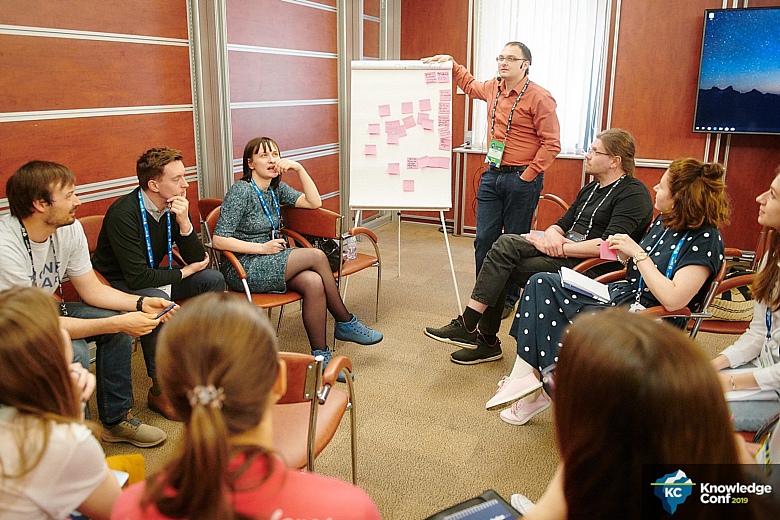
- Did any ideas ready for implementation be voiced at the meetings?
Such ideas were more likely in the reports. For example, there was a report by Gleb Deikalo " Welcome aboard: we introduce new developers to the team " in which he talked about the whole onboarding system created in Badoo. Thanks to this system, beginners can quickly dive into workflows.
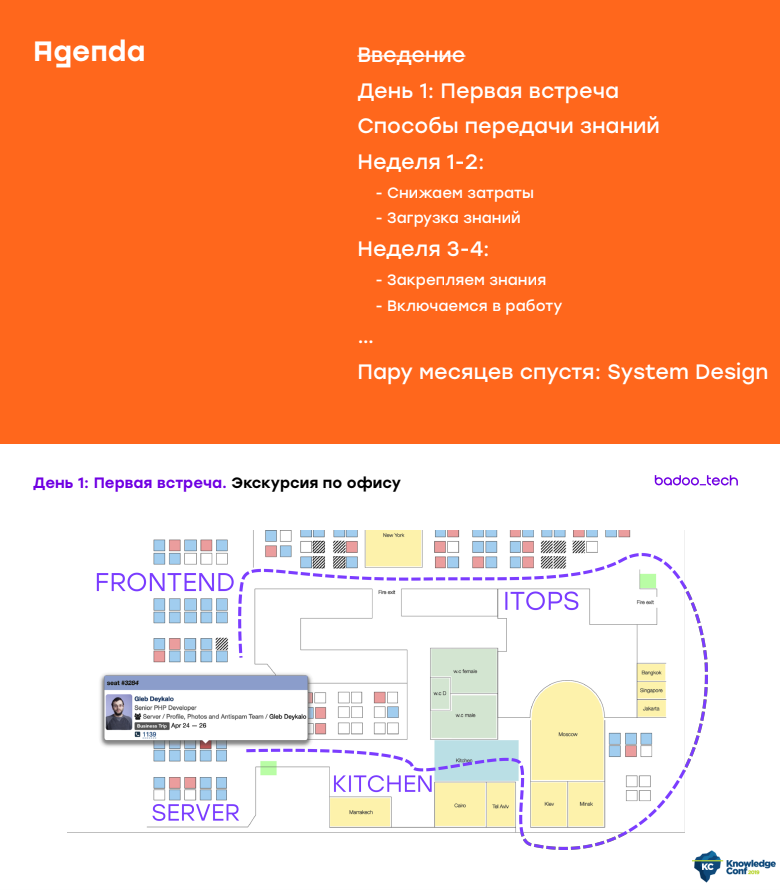
I really liked the approach by which he got rid of the routine. And when I returned from the conference, I introduced the initial stage of a similar system for interns. My implementation, of course, is not as sophisticated as that of Gleb. In fact, I took from him the very idea of a system with certain steps, which I launched in Trello. There I have provided scripts for immersing trainees, in which there are links to all available documentation. And it helps to bring up to date.
- And some curious stories come to mind?
I admire the idea of SkyEng, who have implemented a team consisting entirely of June into their company. They talked about this in the report " Developers Incubator in Skyeng. Why did we hire a whole junior department? " Unfortunately, I could not take anything from their story - we have other processes. But the experience itself is extremely interesting. Their team took off despite the fact that some participants eventually fell off.
- What topics were missing in the program?
It seems to me that on mitapes we managed to talk about everything in general. In general, I really liked: covered the most important thing that hurts the most.
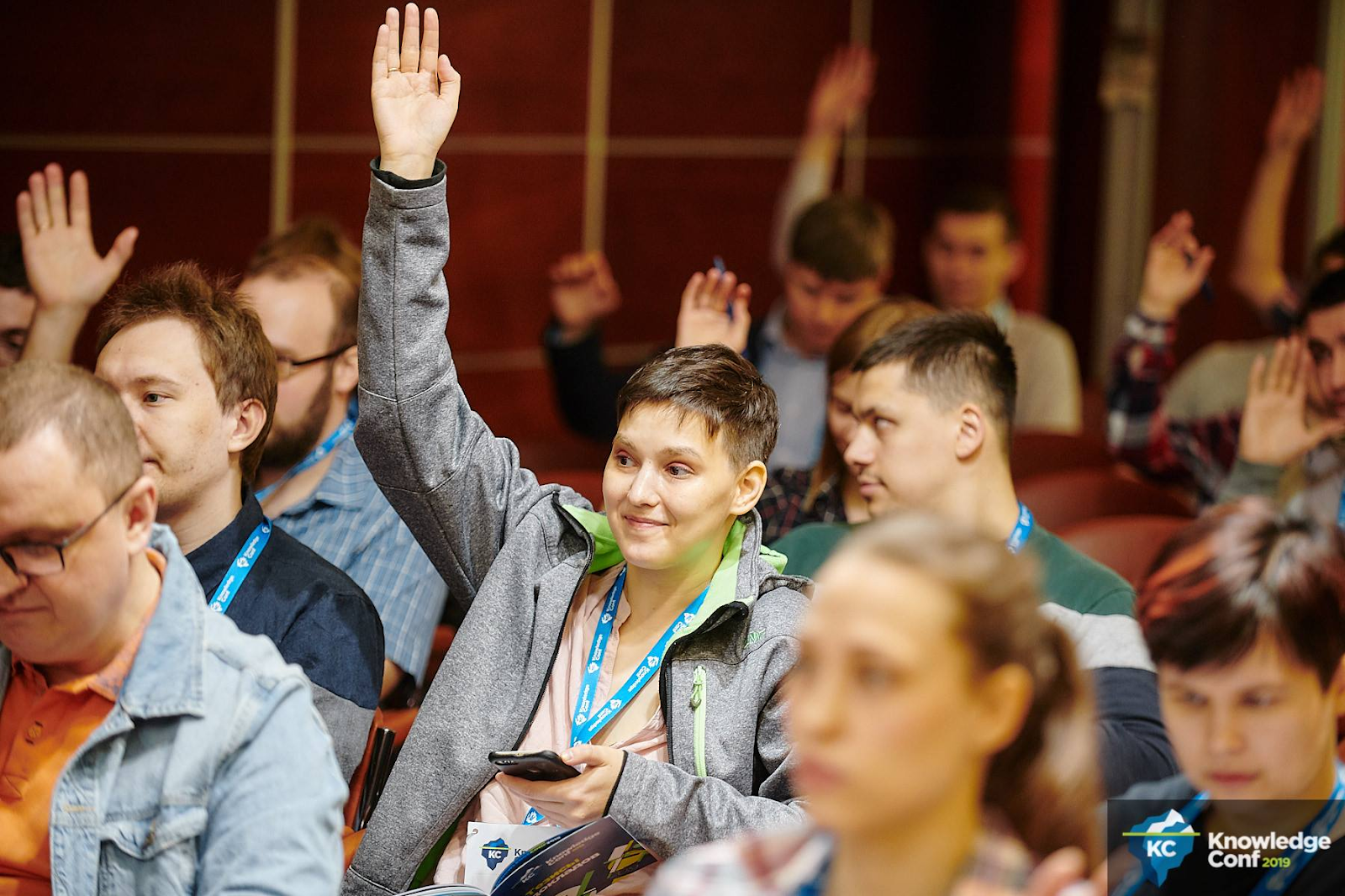
- Are there any wishes to the organizers of the conference?
I would like to wish you, as the organizers, even more coverage, so that you can expand the circle of friends on this topic.
Under the cut, a glance at the event through the eyes of a member of the program committee, the conference speaker and a simple participant: on top presentations, the heavy share of the speaker, and practical tricks that we managed to pull out for ourselves from the event.

Rodion Nagornov head of the training and certification group at Kaspersky Lab, as well as a member of the program committee of KnowledgeConf 2019
')

- Did the public interest in the conference meet your expectations?
It so happened that for me it was the third conference about knowledge management in three weeks, so there is something to compare with. I will say this: the interest of the IT audience to this topic exceeded my expectations, because the attendance of Knowledge Conf was much higher than the previous two conferences, which were positioned by their organizers to a wider audience.
It is great to dial three practically full halls in parallel, plus having the opportunity to hold a meeting for 20 people. At the same time, there remained those who continued to chat on the sidelines while the performances were going.

In my personal opinion, knowledge management is a very important process in any company. What can we say about IT, where everything changes with great speed: from programming languages to personnel. And I am very pleased that so many colleagues share this opinion.
- How would you rate the maturity of the entire knowledge management industry in our country?
Large corporations in the public sector, in the oil industry, have a fully mature process of knowledge management, actively cooperate with foreign leaders, learn from experience. They have something to learn. In the commercial segment definitely can not be said. Very heterogeneous. There is a KROK close to the ideal, for example. But it is rather an exception. Most companies are only beginning to realize that knowledge is their key capital, that developing knowledge sharing processes is vital for success in a rapidly changing environment. What is better for the whole company to learn from one mistake than to lose money on the same mistakes of each department.
It seems to me that the emergence of a separate conference on knowledge in IT is a kind of marker that the knowledge management industry is waiting for a leap in development in the near future.
But for now this is the stage of the adoption of the idea and the primary research.

- Did you cover all aspects? What is sure to talk about next time?
Of course, all aspects cannot be covered in one day. The scope is very extensive. For 24 slots of reports, we had 83 applications. You understand how many speakers had to refuse.
Of course, a number of aspects remained behind the scenes. For example, I really didn’t have enough reports from manufacturers of knowledge management software (yes, there are such) about how they reveal what is needed for effective knowledge management, what research is based on, etc.
It is imperative to expand on the subject of evaluating the return of investments from UZ, the evaluation of the effectiveness of UZ and the staff responsible for this. This will help us to understand the importance of UZ, it is easier to promote ideas in our companies and to understand our place in the company's business. At this conference there were a couple of reports on this, but this question was, in principle, very poorly worked out. Therefore, even two reports are very few for some completeness.
There were not enough any cases about a bundle of knowledge management system and staff training. We talked separately about onboarding, separately about mentoring, but the fact that these processes can be built on the basis of the knowledge gathered within the company, I recall only one case report.
- What reports, in your opinion, were the most useful?
My favorite is Alexey Sidorin. His report was filled with a huge amount of practice, approaches, rakes and artifacts. The presentation of this presentation can now be found on the conference website. By the way, the presentations of other speakers, we also posted a long time.

Besides him, the report by Alexander Orlov from Stratoplan and the absolutely wonderful story of Roman Khorin that the tool for the knowledge management system should be chosen based on the real needs of the team, and it is not necessary to buy an expensive solution, went very well.

In general, with such a competition, it would have been physically impossible to physically accommodate even one weak or useless report, so they were all good. I think each of them found his audience and brought someone a favor.
- What topics and reports have gathered the largest audience?
I moderated Oxford Hall, so I can only say for sure about it. These were the reports of Alexey Sidorin , Alexey Petrov , Grigory Petrov . The rest of the reports also had quite a lot of listeners. Judging by the reviews of colleagues from the PC, it was also hot in other halls, and we were surprised at the influx of visitors.

- Were there any interesting examples or thoughts that can be “implemented right here and now”?
We with the PC in general tried to direct all speakers to the side of the practice. So that listeners can really just take and do. The same adaptation checklists for onboarding novice from Alexey Petrov or daily additional training of new technical support changes on cases of previous shifts from Alexander Solovyov.
When records of reports appear in access, I highly recommend them to review and rehearse everything. In each of them there is at least one practice that you can begin to implement in your work process today.
- What did you personally find most interesting?
Personally, I liked the fact that we brought together people of completely different formations and mentalities on one platform: direct professionals of KM, for whom it is a lifestyle, people from the academic sector, commerce, coaching, enthusiasts, developers, who were engaged in KM, to solve a specific task of their Department ... We collected them and made it possible to share experiences, transfer knowledge, learn to understand each other. From this, in the future, the coolest trade union can turn out, where the different views and competencies of the participants will lead to the most unexpected decisions and discoveries.
I myself am directly involved in knowledge management, and communication on the PC with developers, who for me are usually the target audience, their understanding of knowledge management was a great discovery. Until now, I can not digest it, because I, with my bell tower, represented it all in a completely different way. And the ability to understand your target audience is one of the keys to effective knowledge management.
Maria Smirnova, head of the technical writers group Ozon.ru - one of the speakers

- You presented your report " Knowledge Management with the rapid growth of the company ." Did you like the conference as a speaker?
Yes of course.
- How was the preparation of the report with the program committee? How much has the story conceived by you changed?
We had two test runs with the program committee members, during which the organizers looked to see if my story was suitable for the conference format, whether it was necessary to expand some parts, to add information. Both times I received feedback from them and recommendations for improvement. In addition, they were phoned with a coach who helped add a little bit of substance. Initially it seemed to me that some things should not be told, but he recommended to dwell on them in order to show why such solutions were used.

The general line of the story remained unchanged, but in the course of this work almost the whole ending and some details appeared in the report itself.
- And what was the reaction of the audience?
The subject has caused a keen interest. There were so many questions.
In general, the report was about our specific timeline - what exactly we did, how our processes changed and why, what we came to in six months. Therefore, unfortunately, I had no answer to some of the questions from the audience. They dealt with some specific situations to which we have not yet grown. When we start working with a large number of teams, perhaps the questions asked will be relevant for us, and we will find answers to them.

- And as a viewer, what topics were interesting to you at the conference?
I went to the KnowledgeConf to see how other companies evaluate the effectiveness of this process. Traditionally, this topic is least revealed, because people share some specific experience - what and how they did. But they say very little about the assessment.
- What reports do you remember most?
I liked the big and rich report by Alexey Sidorin from Krok company (“Holistic knowledge management in an IT company”). Their entire knowledge management system is very rich. There are various chat bots, and staff, and interactions between HRs, and IT solutions that they have already established.
It was interesting to listen precisely because of the abundance of instruments, because we are just starting. They want to implement their ideas, because they already have experience - how the company did it.
Also, from the BIOCAD report, I got an idea for tagging information and role models of employees. And about the chat bot (in different versions of the bots talked about three of the five reports that I listened to).

Olga Ilchukova, Technical Writer, Information Technology Center GAU RK - conference attendee
- What impressed you most on KnowledgeConf?
I met a lot of people. Most of all I liked to participate in interactions. At the Igor Zupko mitap, “Technologies of the Future for Knowledge Management: A Session of Collective Dreaming,” we dreamed of cool tools that could solve all our problems related to knowledge collection or onboarding new employees. And Rodion Nagornov taught us how to “sell” the idea of knowledge management to his colleagues, and most importantly - to the management. It was especially interesting.

- Did any ideas ready for implementation be voiced at the meetings?
Such ideas were more likely in the reports. For example, there was a report by Gleb Deikalo " Welcome aboard: we introduce new developers to the team " in which he talked about the whole onboarding system created in Badoo. Thanks to this system, beginners can quickly dive into workflows.

I really liked the approach by which he got rid of the routine. And when I returned from the conference, I introduced the initial stage of a similar system for interns. My implementation, of course, is not as sophisticated as that of Gleb. In fact, I took from him the very idea of a system with certain steps, which I launched in Trello. There I have provided scripts for immersing trainees, in which there are links to all available documentation. And it helps to bring up to date.
- And some curious stories come to mind?
I admire the idea of SkyEng, who have implemented a team consisting entirely of June into their company. They talked about this in the report " Developers Incubator in Skyeng. Why did we hire a whole junior department? " Unfortunately, I could not take anything from their story - we have other processes. But the experience itself is extremely interesting. Their team took off despite the fact that some participants eventually fell off.
- What topics were missing in the program?
It seems to me that on mitapes we managed to talk about everything in general. In general, I really liked: covered the most important thing that hurts the most.

- Are there any wishes to the organizers of the conference?
I would like to wish you, as the organizers, even more coverage, so that you can expand the circle of friends on this topic.
Source: https://habr.com/ru/post/457576/
All Articles